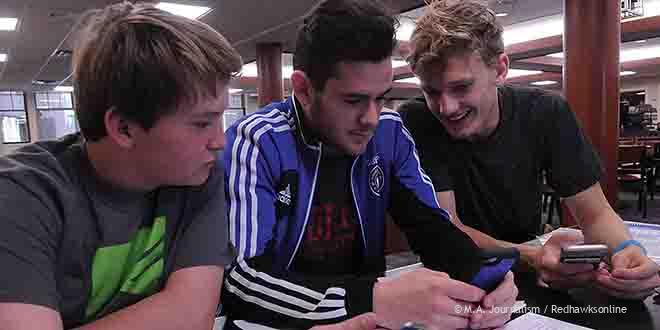Narcissism probed by the individualized worlds of social media sites
Echo, the beautiful young nymph, admired him from afar. He was a handsome young man hunting deer in the forest. Shortly, he noticed her presence, but he would not accept her love.
Tired from the heat of the day and from his exercise, he rested by a quiet pond and gazed into the water, noticing his own reflection.
He fell in love with his own beauty and eventually deteriorated, wasting away while admiring himself in the mirror of the pond’s surface. For this vain act, he is the namesake of a mental disorder. The handsome young man was Narcissus.
Narcissistic personality disorder is described by the Mayo Clinic as a disorder “in which people have an inflated sense of their own importance, a deep need for admiration and a lack of empathy for others.”
Cases of narcissistic personality disorder and its associated traits have increased rapidly over the past two decades, and some people attribute this rise to the prevalence and ubiquity of smartphone use.
On April 11, Minnehaha hosted a screening of the award-winning documentary Screenagers. It was attended by over 500 people.
According to its website, Screenagers “probes into the vulnerable corners of family life, including the director’s own, and depicts messy struggles, over social media, video games, academics and internet addiction.”
The screening was organized by college and guidance counselor Kristin Overton in conjunction with the admissions and marketing departments.
“I thought it would be an interesting look,” said Overton, “at how it impacts your brain, how it impacts you socially, and what it means for students who have grown up with that technology who have parents who do not have that shared experience.”
Smartphones easily allow negative traits along with their corresponding actions to be exercised: through social media, exhibitionism and vanity; through texting and spreading information, exploitativeness; through limited human interaction, self-sufficiency; and through access to almost anything, entitlement and superiority.
“When you have your phone, you decide everything and you get to be whatever kind of person you want to be,” said senior Maddie Smith, “which I think brings out the worst in people sometimes.”
Smartphones offer teenagers a “link” to the outside world without ever leaving the comfortable, personal bubble that has been created and cultivated behind a small pane of glass.
“It’s not real life and it isn’t preparing them well for handling real-world adversity,” said Overton. “So if life happens and you aren’t able to adapt to it or react to it in a way that’s healthy and positive and good for you both short and long term, that’s a problem.”
Overton explained that much of a person’s character development takes place at a young age, but warned against using that as a shield.
“There is a level of responsibility that comes with getting older,” said Overton.
In fact, there are steps to take that are proven to help those with narcissistic tendencies: practicing mindfulness, consciously exercising gratitude and professional consultation, among other things.
On a less extreme level, though, Overton said that self-monitoring can be extremely effective.
“Having some sort of balance with it is really important,” said Overton. “I think that kids who keep themselves busy with activities that are, at their core, both social and team-based are less likely to be as consumed with smartphones and the ‘me, me, me, me’ [attitude] all the time.”
When teenagers are in situations like these, they are responsible not only for themselves, but also for others, a concept Overton says is very important.
“Being involved in any kind of team,” said Overton, “is not only going to physically give you a break from your phone, but it’s also going to challenge you to do things like face criticism and develop empathy for other people and recognize that you aren’t entitled to anything just because you’re standing there with a pulse.”
If teenagers don’t put down their phones every once in awhile to interact with and face the outside world, they may end up, like Narcissus, hunched over, wrapped up in the perfection of the worlds they have created for themselves, admiring their own reflection.
This time not in the rippled surface of a pond but in the glass of their smartphone screens.

